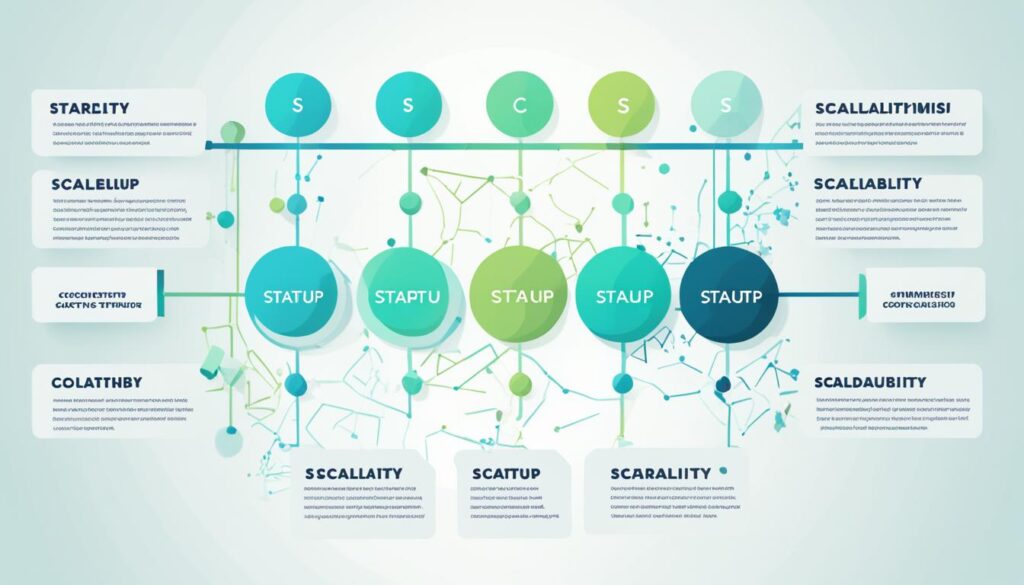As an experienced venture capitalist, I’m often asked how I evaluate the scalability of a startup’s business model. It’s a crucial question, as the ability to scale is a key factor in determining whether a company is worthy of investment. After all, my goal is to identify startups with the potential to generate high returns for my firm and its investors.
The assessment process involves a deep dive into various aspects of the startup’s operations, from its revenue model and cost structure to its market potential and customer acquisition strategies. By thoroughly understanding these key elements, I can gauge the startup’s ability to scale and achieve sustainable growth.
But what exactly are the critical components I examine when evaluating a startup’s scalability? And how do I use this information to make informed investment decisions? Let’s dive in and explore the intricacies of this assessment process.
Key Takeaways
- Venture capitalists analyze a startup’s revenue model, cost structure, market potential, and growth strategies to assess its scalability.
- A scalable business model allows startups to rapidly expand their customer base and revenue without a proportional increase in costs.
- Identifying the target market, evaluating market trends, and analyzing the competitive landscape are crucial in determining a startup’s growth potential.
- Operational efficiency, infrastructure, and the strength of the founding team are also key factors in a startup’s ability to scale.
- Financial projections, valuation, and potential exit strategies are considered to ensure the investment opportunity aligns with the venture capitalist’s return expectations.
Understanding Venture Capital and Startup Scalability
Venture capital is a form of private equity financing that provides funding to early-stage, high-growth potential companies. Venture capitalists invest in startups with the aim of generating substantial returns through the company’s growth and eventual exit, such as an initial public offering (IPO) or acquisition. Scalability is a critical factor for startups seeking venture capital, as investors look for businesses that have the ability to rapidly expand their customer base, revenue, and market share without a proportional increase in costs.
What is Venture Capital?
Venture capital is a specialized form of private equity financing that focuses on investing in young, innovative companies with high growth potential. Venture capitalists, or VCs, are typically organized as investment firms that pool money from various sources, such as institutional investors, high-net-worth individuals, and pension funds, to invest in promising startups. The goal of venture capitalists is to identify and fund companies that have the potential to achieve rapid and substantial growth, ultimately generating significant returns for their investors.
The Importance of Scalability for Startups
A scalable business model is essential for startups seeking venture capital investment. Venture capitalists are looking for companies that have the ability to scale their operations and achieve economies of scale as they grow. This means that as the startup’s customer base, revenue, and market share expand, the costs associated with serving those customers do not increase proportionally. A scalable business model allows startups to maximize profitability and generate the high returns that venture capitalists seek.
By investing in startups with scalable business models, venture capitalists can potentially achieve significant returns on their investments. As the startup grows and scales, the value of the venture capitalist’s equity stake can increase exponentially, leading to lucrative exits through IPOs or acquisitions. Therefore, assessing the scalability of a startup’s business model is a crucial part of the venture capital investment process.

Business Model Evaluation
When evaluating a startup’s scalability, I closely examine its business model, focusing on the revenue model and cost structure. I assess the startup’s ability to generate revenue through a
scalable, repeatable, and sustainable
process. This includes analyzing the
pricing strategy, sales channels, and the potential for recurring or subscription-based revenue
. Additionally, I evaluate the startup’s
cost structure
to ensure that as the business scales, the costs do not grow proportionally, allowing for increased profitability and cash flow.
Assessing the Revenue Model
A key aspect of a scalable business model is the revenue model. I examine how the startup generates revenue, looking for
repeatable and scalable
sales processes that can be easily replicated as the business grows. This may include evaluating the startup’s
pricing strategies, sales channels, and the potential for recurring revenue streams
such as subscriptions or long-term contracts.
Analyzing the Cost Structure
In addition to the revenue model, I also closely analyze the startup’s cost structure. I assess whether the business can
maintain or improve its profit margins as it scales
. This involves examining the startup’s fixed and variable costs, as well as its
operational efficiency and ability to leverage economies of scale
. By ensuring that the cost structure remains proportional to revenue growth, I can determine the startup’s potential for increased profitability and cash flow as it scales.

| Metric | Startup A | Startup B | Startup C |
|---|---|---|---|
| Revenue Model | Subscription-based | Freemium with upsells | Transaction-based |
| Gross Profit Margin | 65% | 55% | 45% |
| Cost Structure | Mostly variable costs | Balance of fixed and variable costs | Mostly fixed costs |
| Scalability | High | Medium | Low |
By closely examining the startup’s
revenue model and cost structure
, I can assess the overall scalability of its business model and determine if it aligns with the
investment criteria and return expectations
of my venture capital firm.
Market Size and Growth Potential
A crucial aspect of assessing a startup’s scalability is understanding the size and growth potential of its target market. As a venture capitalist, I carefully identify the startup’s target market, analyzing factors such as market size, demographics, and industry trends. This analysis helps me determine the startup’s ability to scale and achieve substantial revenue growth within a sizable addressable market.
Identifying the Target Market
When evaluating a startup’s market size and growth potential, I first focus on identifying the company’s target market. This involves examining factors like the size of the overall market, the specific demographics and geographic locations of the target customers, and any industry-specific trends that could impact the market’s growth trajectory. By clearly understanding the startup’s target audience, I can better assess its potential to capture a significant share of a large and expanding market.
Evaluating Market Trends and Projections
In addition to identifying the target market, I also closely evaluate the market’s projected growth. This includes analyzing factors such as market penetration, adoption rates, and the potential for the startup to capture a sizable portion of the market. I examine industry reports, market research, and other data sources to understand the market’s historical growth, current trends, and future projections. This analysis helps me determine whether the startup’s target market has the necessary size and growth potential to support the company’s scalability and long-term success.

How do venture capitalists assess the scalability of a startup’s business model?
As a venture capitalist, I assess the scalability of a startup’s business model through a comprehensive evaluation process. I closely examine the startup’s revenue model, cost structure, market potential, operational efficiency, competitive landscape, and customer acquisition strategies. By thoroughly analyzing these key aspects, I can determine the startup’s ability to scale and achieve sustainable growth, which is crucial for generating high returns for my firm and its investors.
To evaluate the scalability of a startup’s business model, I first analyze the company’s revenue model. I assess the startup’s pricing strategy, sales channels, and potential for recurring or subscription-based revenue, ensuring that the revenue generation process is scalable, repeatable, and sustainable. Additionally, I examine the startup’s cost structure to ensure that as the business scales, the costs do not grow proportionally, allowing for increased profitability and cash flow.
Next, I evaluate the size and growth potential of the startup’s target market. I carefully identify the market, analyzing factors such as market size, demographics, and industry trends. I then assess the market’s projected growth, examining factors like market penetration, adoption rates, and the potential for the startup to capture a significant market share. This analysis helps me determine the startup’s ability to scale and achieve substantial revenue growth within a sizable addressable market.
Operational efficiency and infrastructure are also critical factors in my assessment of a startup’s scalability. I examine the company’s operational processes, including manufacturing, logistics, and customer service, to ensure they can effectively scale to meet growing demand. I also evaluate the startup’s technology and infrastructure, such as its IT systems, data management, and production capabilities, to determine if they can support the company’s planned growth trajectory.
Additionally, I analyze the competitive landscape in which the startup operates. I evaluate the market’s key players, their market share, product offerings, pricing, and growth strategies. This analysis helps me understand the startup’s competitive positioning, potential barriers to entry, and the company’s ability to differentiate itself and maintain a sustainable competitive advantage as it scales.
Finally, I assess the startup’s customer acquisition and retention strategies. I evaluate the company’s marketing and sales tactics, as well as its ability to retain customers over time. High customer churn can hinder a startup’s ability to scale and maintain profitability, so I closely examine the startup’s customer loyalty and retention rates.
By thoroughly evaluating these key aspects of a startup’s business model, I can determine the company’s scalability and its potential to generate high returns for my firm and its investors. This comprehensive assessment process is crucial in identifying the most promising investment opportunities in the venture capital landscape.
Operational Efficiency and Infrastructure
As a venture capitalist, I not only assess the scalability of a startup’s business model but also closely examine the company’s operational efficiency and infrastructure. This comprehensive evaluation helps me determine if the startup has the necessary processes, technology, and resources to support its planned growth trajectory.
Examining Operational Processes
I thoroughly analyze the startup’s operational processes, including manufacturing, logistics, and customer service. I evaluate the efficiency and scalability of these processes to ensure they can effectively meet growing demand without compromising quality or customer satisfaction. This assessment includes examining the startup’s production capacity, supply chain management, and the ability to deliver a consistent, high-quality customer experience as the business scales.
Evaluating Infrastructure and Technology
In addition to operational processes, I also assess the startup’s technology and infrastructure. I examine the company’s IT systems, data management capabilities, and production facilities to determine if they can support the planned growth. This evaluation includes analyzing the startup’s ability to handle increased data volumes, streamline operations, and invest in the necessary technology and infrastructure to scale efficiently.
By thoroughly evaluating the startup’s operational efficiency and infrastructure, I can gain a comprehensive understanding of its readiness to scale. This assessment allows me to identify potential bottlenecks, risks, and areas for improvement, which are crucial factors in determining the startup’s overall scalability and investment potential.

Competitive Landscape Analysis
As part of my assessment of a startup’s scalability, I analyze the competitive landscape in which the company operates. I evaluate the market’s key players, their market share, product offerings, pricing, and growth strategies. This analysis helps me understand the startup’s competitive positioning, potential barriers to entry, and the company’s ability to differentiate itself and maintain a sustainable competitive advantage as it scales.
By examining the competitive landscape, I gain valuable insights into the market dynamics and the startup’s ability to withstand competition and capture a significant market share. I assess the strengths and weaknesses of the startup’s competitors, their market dominance, and their strategies for growth and expansion. This information allows me to determine the startup’s potential for disruption and its capacity to carve out a distinctive niche in the market.
Furthermore, my evaluation of the market competition helps me gauge the startup’s ability to differentiate its products or services and maintain a competitive edge. I analyze factors such as pricing, product features, customer service, and brand reputation to assess the startup’s potential to attract and retain customers as it scales its operations.
| Key Competitor | Market Share | Product Offerings | Pricing | Growth Strategies |
|---|---|---|---|---|
| Amazon | 38% | Diverse e-commerce products, cloud computing, digital media | Competitive pricing, dynamic pricing algorithms | Aggressive expansion, acquisitions, global distribution |
| Walmart | 22% | Retail stores, e-commerce, groceries, home goods | Everyday low prices, discounts, bundled offers | Omnichannel strategy, store expansions, e-commerce growth |
| Target | 11% | Retail stores, apparel, home goods, electronics | Competitive pricing, loyalty programs, seasonal discounts | Store modernization, digital transformation, private label brands |
By thoroughly analyzing the competitive landscape, I can better understand the startup’s ability to differentiate itself, overcome barriers to entry, and achieve sustainable growth as it scales its operations. This comprehensive assessment is a crucial part of my evaluation of the startup’s scalability and its potential to generate high returns for my firm and its investors.
Customer Acquisition and Retention Strategies
A critical factor in a startup’s scalability is its ability to effectively acquire new customers and retain them over time. As a venture capitalist, I evaluate the startup’s marketing and sales strategies, assessing their ability to reach and convert target customers in a cost-effective manner. This includes analyzing the startup’s customer acquisition strategy, focusing on factors such as their target market identification, lead generation tactics, and the effectiveness of their advertising and promotional campaigns.
Evaluating Marketing and Sales Strategies
In addition to the customer acquisition strategy, I also closely examine the startup’s sales processes and techniques. I assess the sales team’s capabilities, the quality of their sales collateral, and the overall sales funnel efficiency. By understanding the startup’s marketing and sales strategies, I can gauge their potential to acquire customers at scale and in a sustainable manner.
Assessing Customer Loyalty and Retention
Equally important to customer acquisition is the startup’s ability to retain its customers over time. I analyze the startup’s customer loyalty and retention rates, evaluating factors such as customer satisfaction, repeat business, and the effectiveness of their customer service and support. High customer churn can hinder a startup’s ability to scale and maintain profitability, so I place significant emphasis on the company’s customer loyalty and retention strategies.

Team and Management Assessment
The strength and capabilities of the startup’s founding team and management are crucial factors in my assessment of scalability. I closely evaluate the founders’
vision
, strategic thinking, and
execution capabilities
, as well as the broader team’s
expertise
and
relevant experience
, and their ability to lead the company through a high-growth phase.
Evaluating the Founders’ Vision and Execution Capabilities
A clear and compelling
founder’s vision
is essential for a startup to achieve scalability. I assess the founders’ strategic thinking, their understanding of the market, and their ability to articulate a long-term growth plan. Additionally, I evaluate the founders’
execution capabilities
, looking for evidence of their past successes in building and scaling a business.
Assessing the Team’s Expertise and Experience
Beyond the founders, I also closely examine the broader management team and key employees. I assess their
relevant industry experience
, technical skills, and proven track record of delivering results. A well-rounded team with complementary expertise is crucial for a startup to effectively execute its growth strategies and overcome the challenges that come with scaling a business.
Ultimately, a talented and cohesive team with a clear vision and the necessary skills to implement it is essential for a startup to successfully scale. By thoroughly evaluating the founding team and management, I can gauge the startup’s ability to execute its growth plans and achieve sustainable expansion.

Financial Projections and Valuation
As a venture capitalist, I thoroughly analyze the startup’s financial projections and models to assess its scalability and investment potential. I examine the startup’s revenue forecasts, cost structures, profit margins, and cash flow projections to determine if the business can achieve sustainable growth and profitability as it scales.
Analyzing Financial Models and Forecasts
My evaluation of the startup’s financial projections involves a detailed assessment of their revenue forecasts, cost structures, and cash flow projections. I scrutinize the underlying assumptions and methodologies used in the financial modeling to ensure they are realistic and well-supported. This analysis helps me gauge the startup’s ability to generate sufficient revenue, manage expenses, and maintain healthy cash flow as the business scales.
Determining Valuation and Investment Potential
In addition to analyzing the financial projections, I also assess the startup’s valuation to ensure that the investment opportunity aligns with my firm’s return expectations and investment criteria. This valuation analysis takes into account factors such as the market potential, competitive landscape, management team, and the startup’s progress to date. By carefully evaluating the startup’s valuation, I can determine the appropriate investment amount and structure that will provide a favorable return on investment for my firm and its investors.

| Financial Metric | Year 1 | Year 2 | Year 3 |
|---|---|---|---|
| Revenue Forecasts | $2.5 million | $5.1 million | $9.8 million |
| Profit Margins | 25% | 30% | 35% |
| Cash Flow Projections | $0.6 million | $1.5 million | $3.4 million |
Exit Strategy Considerations
When evaluating a startup’s scalability, I also consider the potential exit strategies and the investor’s return on investment (ROI). As a venture capitalist, I assess the likelihood of the startup achieving a successful exit, such as an initial public offering (IPO) or acquisition, which would allow my firm to realize its investment gains. For instance, Atlassian’s acquisition of Loom for approximately $975 million demonstrates the potential for lucrative exits in the startup ecosystem.
Additionally, I evaluate the potential ROI based on the startup’s growth trajectory, market position, and competitive landscape, as this will ultimately determine the viability and profitability of the investment. According to recent data, while the global M&A deals in the startup ecosystem declined by 8%, the global IPO market saw a 24% increase in the number of IPOs, highlighting the evolving landscape of potential exit options. For example, Airbnb aimed to raise approximately $2.44 billion from its IPO, showcasing the substantial returns that can be generated through successful public offerings.
By carefully considering the startup’s exit strategy and the corresponding return on investment, I can better determine the scalability and long-term viability of the business model, which is crucial in my decision-making process when evaluating venture capital investment opportunities.

Conclusion
In conclusion, as a venture capitalist, I employ a comprehensive assessment process to evaluate the scalability of a startup’s business model. By analyzing the startup’s revenue model, cost structure, market potential, operational efficiency, competitive landscape, and customer acquisition strategies, I can determine the company’s ability to scale and achieve sustainable growth. This evaluation is crucial in identifying investment opportunities that have the potential to generate high returns for my firm and its investors.
Ultimately, the scalability of a startup’s business model is a key factor in my decision-making process when considering venture capital investment. I carefully assess factors such as startup scalability assessment and venture capital investment criteria to identify companies with the greatest potential for growth and profitability. By doing so, I can ensure that my firm and its investors maximize their returns on these strategic investments.
